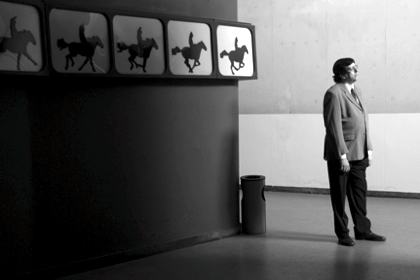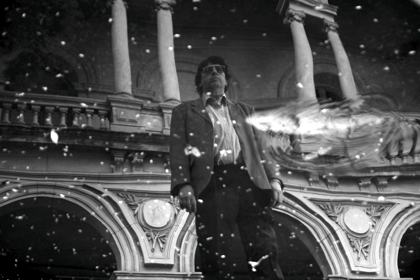Film review: A Useful Life

A genial homage to a failing cinematheque and its waning artform, Federico Veiroj’s comedy also proves an ode to reinvention, says Mar Diestro-Dópido
Cinema is changing rapidly, and so are the habits of old-time hardcore cinephiles. But all that time spent in the dark watching flickering images, sitting on rundown chairs with a mere handful of other film devotees, is not all in vain. For this can also be ‘a useful life’, as Jorge, the protagonist of this second comedy from Uruguayan director Federico Veiroj, discovers in the course of the film’s captivating, warmly unassuming 66 minutes.
Trying to save a ship that is irremediably sinking, middle-aged, single, good-natured and proper-to-a-fault Jorge (played with pitch-perfect sobriety by real-life film critic Jorge Jellinek) has dedicated 25 years of his life to running Montevideo’s Cinematheque, together with its director Martínez (Manuel Martínez Carril, the former director of this real-life organisation). But the decline in attendances and regular malfunctioning of equipment proves too much for the funders, who decide not to “carry on supporting cultural institutions that are not profitable projects”. Unable to sustain itself economically, the Cinematheque has to close down – a momentous event that, together with an encounter with a woman, Paola, will change Jorge’s life forever.
Albeit fictional, the struggle to survive of Jorge’s cinephile haven inevitably resonates at a time of crisis for cultural institutions. Yet this is no nostalgic elegy for the past, but a journey into a hopeful future, played out through a deadpan, tongue-in-cheek seriousness that more than once verges on absurdity. A former cinematheque employee himself, Veiroj manipulates the language of classical cinema with measured dexterity to pay a heartfelt, exquisite homage to this increasingly precarious way of life.
Shot in colour but transferred to a rich, grainy black and white, every frame is lifted from film history and instantly familiar – from the geometric angles of German expressionism, to the saturated contrasts of silent cinema, and extreme close-ups on objects, hands and faces recalling Gregg Toland’s photography in Citizen Kane. Arauco Hernández Holz’s camera accompanies Jorge down corridors and into storage rooms to reveal the heart and soul of what feels like a pulsating organism, at times reminiscent of the building in Lisandro Alonso’s Fantasma (2006), itself an old Buenos Aires cinema.

The score – originally composed in the 1920s by Eduardo Fabini – also pastiches westerns, silent films, musicals and classical Hollywood. The fact that it’s not used diegetically means we hear the music as if it’s emerging from a nearby screening, or as if we are able to hear what’s going on in Jorge’s mind – an evocation of the many films he conjures in order to help him confront his new life, in which he reinvents himself as the hero of his own romantic film.
Like the denizens of the cinephile town in Alejandro Agresti’s El viento se llevó lo qué (1998), Jorge’s existence literally becomes the snippets of films to which he’s dedicated his whole life. Hence the trumpets of Ford’s Stagecoach announce the beginning of his new incarnation; he discovers the streets of Montevideo like Gene Kelly in Singin’ in the Rain; he dances with Fred Astaire’s debonair panache on the steps of the university; and walks into the flickering lights of the big city as in Murnau’s Sunrise. Exhilaratingly idiosyncratic, Veiroj’s film is ultimately an ode to the blind faith – childlike if you will, like Ana’s relationship with Frankenstein in Erice’s masterly Spirit of the Beehive – in the transformative power of film.
See also
The Artist reviewed by Tony Rayns (January 2012)
The new new Argentine cinema: Mar Diestro-Dópido on a new generation of Argentine filmmakers forging their own identity (October 2011)
The Silent House reviewed by Mar Diestro-Dópido (May 2011)
Luis García Berlanga, 1921-2010: Mar Diestro-Dópido’s obituary of the director and co-founder of the Spanish Cinematheque and Film Academy (February 2011)
El baño del Papa reviewed by Michael Brooke (August 2008)
The Dreamers reviewed by Ginette Vincendeau (February 2004)



